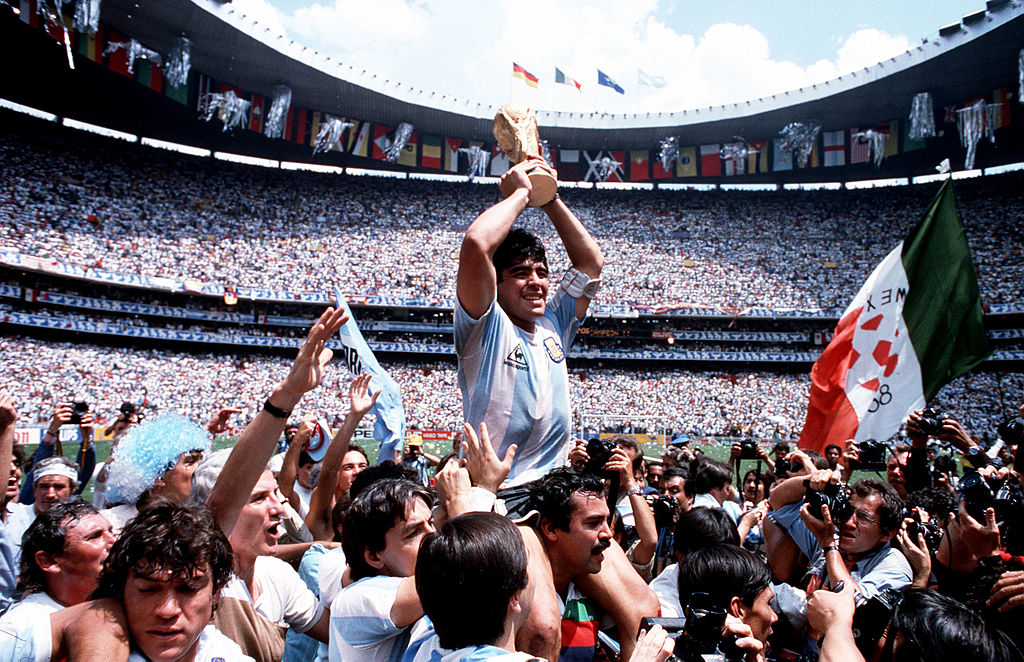Besides being the greatest footballer of our age, Diego Maradona often showcased the best and worst of the human race. To remember him is also to recognise how flawed we are.
The older you get, it’s common for younger fans to ask you to name the greatest footballer you ever watched. Though the process of sifting through dozens of mental highlights reels is a pleasurable one, there will only ever be one answer. I suspect it will be that way for most of my generation. You didn’t watch Diego Maradona play. You experienced him, and it was a roller-coaster like no other.
When the news came two years ago, it was sadly inevitable. In the months since, I’ve read tributes from those that weren’t even born when the bloated caricature of a player finally left the pitch. Their experience of him comes from moving pictures, most of which date back more than three decades. Some, like Asif Kapadia’s two-hour-long documentary and Emir Kusturica’s more personal paean, offer great insights into the man and his life as the golden boy in the bubble. What they can’t do is recreate the feeling of what it was like to watch him.
No matter how articulate you are, how can you possibly explain that to someone? How do you convey the sensation of a first kiss, or that feeling when a tiny finger curls around your own? You can’t. These are moments you live through which endure as long as your memory box is intact. Maradona was such a feeling. An emotion you lived.
The troughs were many. He was no Lionel Messi or Cristiano Ronaldo, or even Pele, who were consistently brilliant for years. Maradona took you to impossibly high peaks, and then he — and you, by extension — came crashing back down. In Forever Young, Bob Dylan sings: “May you build a ladder to the stars and climb on every rung…” Maradona reached the top of that ladder a few times. On each occasion, he skydived back to Earth. Without parachutes. That was his life, and those that watched it play out on the most public stages lived the agony and ecstasy with him.
What peaks they were too. There have been wizards of the dribble before — pirouettes, Cruyff turns, defenders getting twisted blood. Maradona, partly as a necessity to escape the brutal man-marking he was often subjected to, performed his sleight of feet at astonishing speed. Even when pushed off balance, his ability to control the ball and place it where he wanted were unparalleled.
And he did this for teams that were built around his fusion of trickery, street smarts and strength of will. For most of his life, Maradona carried with him the resentment of being excluded from the 1978 World Cup squad on home soil. That was a great Argentine team, with several candidates for an all-time XI. The one that he led to glory eight years later didn’t possess such riches.
It was the same story with Napoli, whose fans had spent most of their existence being taunted about their poverty, cholera and the Camorra. When Maradona arrived in Naples after a largely disappointing two years in Barcelona, Juventus and the two Milan giants had better squads, as did Roma, Torino and Verona.
But once Napoli assembled an ensemble cast worthy of the great auteur in their midst, they finished third, first, second, second and first in consecutive seasons. Those remain the only two Serie A titles in their history. The first, in 1986–87, was celebrated with such fervour that the graffiti outside one of the city’s cemeteries simply said: ‘You don’t know what you missed.’
His best years, straddling the World Cup triumph, were spent at Napoli, and it’s just a pity that most of us never saw them, played out as they were in the pre-satellite-television years. But long after the descent from the stars, his influence on the game, especially in Argentina, was unmistakable.
The cult of the no. 10 was such that the devout just referred to him as D10S — Spanish for God. And even before Messi came along, there was a long line of diminutive imitators who modelled their games on the playmaker without peer. Ariel Ortega, Pablo Aimar and Marcelo Gallardo were all special players, but the constant comparisons hampered their careers.
The two who came closest to the standards he set couldn’t be more dissimilar. Juan Roman Riquelme was the calm to Maradona’s storm, a gangly and unhurried midfield prompter with the same gift for finding the right pass. Carlos Tevez, like his idol, played like a street urchin. As with Maradona, it was the bronca as much as skill that drove him. In Argentina, the word is used quite differently to how it is in Spain, signifying as it does a rage that stems from frustration. Its closest English equivalent is probably ‘pissed off’.
But it wasn’t just other generations of players that Maradona inspired. There are millions of fans all around the world who will never forget him, and the way he touched their lives. Most of them are not writers, but there’s a beauty to the words they summon up as they remember him. “I still remember staying awake late and going as a gang to the only house in the neighbourhood that had a TV,” said a friend who grew up in a village in Kerala. “Emotionally watching every bit of the game. We felt we too won the World Cup with him.”
That was the thing with Maradona. There was no halfway house with him. Whether you loved him or loathed him, and there are millions in both camps, you were swept away on that wave of emotion every single time. And if we couldn’t control it, how could we expect him to?
The outpouring of grief worldwide after his death had less to do with the passing of a favourite athlete and much more with how we perceive ourselves and life itself. Unlike many modern-day sporting icons, where you don’t know how much of what you see is Public Relations spin, Maradona was painfully real. His struggles, played out in the public domain for four decades, were ours. If Diego was the good son, affectionate partner and doting dad, Maradona symbolised the excesses that can derail any of us. He represented the best and worst of humanity
One of the most poignant images in the Kapadia documentary has Maradona talking about what the turf meant to him. “When you’re on the pitch, life goes away,” he says. “Problems go away. Everything goes away.”
Now, he’s gone. The little boy, who dreamed of somehow playing first-division football and buying a house for his parents, nearly drowned in a sewer in the slum where he grew up. He was laid to rest after three days of national mourning. Nearly two decades ago, at his testimonial game long after the halcyon years had passed, Maradona said: “I made mistakes, and I paid for them. But the ball is still pure.”
So are the memories he left us. This most flawed of humans, who gave us more joy than any other.





